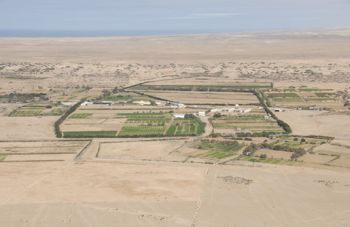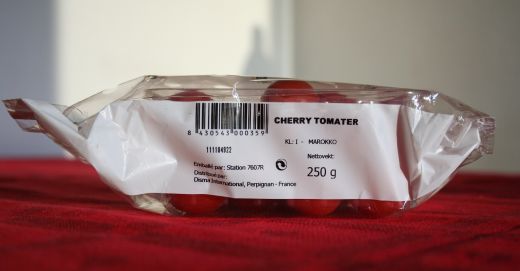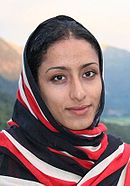
For a few days more you will still find tomatoes from occupied Western Sahara on the vegetable counters of the Norwegian grocery store Coop. On Wednesday they stopped the controversial import. Norwatch, 11 March 2009.
By Erik Hagen
Read the story on Norwatch
11 March 2009
When you go to the vegetable counter in Coop supermarkets, you find fresh, tempting, plastic-wrapped tomatoes. The tomatoes are labelled with the name “Azura”, and on the packages it says that the country of origin is “Morocco”. But the label is lying.
Some of the tomatoes that Coop for months has marketed and sold in Norway have actually been cultivated in occupied Western Sahara – by Moroccan settlers. The Norwegian Ministry of Foreign Affairs advises against such trade with Moroccan interests in Western Sahara.
All of this past autumn and winter Norwatch has been digging into the Norwegian import of vegetables from occupied Western Sahara. Coop first confirmed that they import from the area, and the trade has secretly been taking place all winter.
“Today we have informed our supplier that in the future we only want products that they can guarantee have been produced in Agadir,” Bjørn Kløvstad, communications director at Coop, wrote in an e-mail to Norwatch on Wednesday 11 March 2009.
Employs Settlers
The area where the tomato plantations are located, by the coastal town of Dakhla, covers an area of several square kilometres.
According to the Moroccan newspaper Le Matin, the new agricultural production employs all of 6000 people. The number of employees is expected to triple by 2020.
According to what Norwatch has learned, almost all of the employed are settlers who have moved into Western Sahara after the occupation. The new agricultural commitment is a part of Morocco’s strategy to settle the southern parts of Western Sahara. The Moroccan king is also supposed to have proprietary interest in the tomato industry in the occupied areas, according to the newspaper TelQuel.
Coop’s supplier of tomatoes, the French company Azura, is owned by a French-Moroccan family. The company has 36 greenhouse plantations in Agadir in Morocco and 2 in Dakhla in occupied Western Sahara. The company’s Dakhla plantations were started in 2006 and today cover an area of 76 hectares. According to Azura’s web pages, the city of Dakhla is located in “South Morocco”.

The photograph to the right is from a Moroccan government web site and shows the tomato plantations in Dakhla.
Azura’s French headquarters first confirmed to Norwatch that they export tomatoes to Norway, Sweden, Finland and Denmark but became silent when we sent further queries as to the exact place of origin, labelling of the tomatoes and customers in Norway. Norwatch has sent four enquiries to Azura’s public relations officer during the past 4 months; so far none of them has been answered. Norwatch therefore got in touch with three of the biggest importers of fruit and vegetables in Norway: ICA, Bama and Coop. Only Coop confirmed that they purchase from Azura’s plantations – including those in Western Sahara. ICA and Bama do not import tomatoes from Morocco.
“We have, in the light of your queries, checked the “composition” of the products we have received from this supplier, and it turns out that they have also produced on a small scale in Dakhla, imported it to Agadir – for resale to us,” Kløvstad confirmed to Norwatch on Wednesday.
He believes that the attention to the Western Sahara issue in Norway makes it unlikely that such import will continue in the future.
Article continues beneath photo.

Pleased Peace Prize Winner
The Sahrawi winner of the Students’ Peace Prize for 2009, Rabab Amidane (to the right), is pleased to hear the news about Coop’s import stop.

“That’s good news! Only Morocco profits from this industry,” Amidane told Norwatch.
After she received the Peace Prize in Trondheim in February for her human rights work, she has been travelling around Norway on a lecture tour and spoken about, among other things, all those Norwegian companies that participate in the plunder of Western Sahara’s natural resources.
On Wednesday Amidane took part in a Western Sahara demonstration in front of the Parliament in Oslo, arranged by, among others, all the political youth parties.
Opening for Customs Cheating
Norwatch has previously reported that Norway, through its EFTA collaboration, has entered into free trade agreements with the occupation powers Morocco and Israel. The agreements apply to goods produced within the two countries’ internationally recognized borders.
But this, nevertheless, does not prevent Moroccan and Israeli producers from selling products from occupied territory to the European markets. The EU has especially cracked down on the practice of importing from occupied Israeli areas. A series of European importers were caught red-handed in cheating with regard to the country of origin. In the period from 1 February to 30 June 2008 British customs authorities refused to accept 529 Israeli certificates of origin.
Norway’s EFTA agreement with Morocco could entail that Norwegian importers cheat with regard to customs duty to the Norwegian national treasury. Norwatch has previously written that it is impossible to know to what extent the customs authorities check the certificates of origin from Morocco/Western Sahara.
Norway imports close to 1 tonne of tomatoes from Morocco yearly. The customs duties for tomatoes in Norway vary throughout the year and are especially high during the summer half of the year, when Norwegian farmers produce tomatoes themselves. During this period Norway normally does not import any tomatoes from Morocco. In the winter, however, the customs duty is zero, no matter what country one wishes to import from.
In the in-between period in October the customs duty is relatively low. During the last 2 weeks of October there are no customs on the import of Moroccan tomatoes, whereas the duty for all other countries is 0,2 euros for 1 kg. The difference makes it possible for companies that import tomatoes from Western Sahara – but falsely label them as Moroccan – to get away with a cheaper tariff.
It is not known whether Norwegian importers have utilised such loopholes by falsely labelling Western Saharan products as Moroccan.
Norwatch has earlier reported that it is impossible to ascertain if the Norwegian customs service checks whether Israeli and Moroccan products actually stem from where it is claimed or whether they come from occupied territories.
Occupied
In 1975 Morocco and Mauretania entered into a secret agreement with the earlier colonial power Spain with regard to dividing Western Sahara in two. The northern part was to become the property of Morocco, and the southern part was to go to Mauretania. The agreement was in conflict with a series of UN resolutions that had demanded that the territory be decolonised. The International Court of Justice in The Hague had also concluded that the area belongs to the local inhabitants and not one of the neighbouring countries.
The area from which Coop has imported tomatoes was first occupied by Mauretania in 1975. The majority of the local inhabitants then fled from the area. When the Sahrawis in 1979 entered into a peace agreement with Mauretania, and Mauretania withdrew, Morocco promptly moved in.
“The General Assembly deplores greatly the deterioration of the situation after Western Sahara continues to be occupied by Morocco and that the occupation has been expanded to the territory that Mauretania has recently evacuated,” according to General Assembly Resolution 34/37 with regard to the area where the tomato plantations are located.
But international pressure never got much further than that. Especially France has supported Morocco’s occupation, both politically and militarily. And during the past few years the French-Moroccan tomato enterprise Azura has seen the possibilities in the occupied country.
German trade fair should stop promoting Azura, groups say
German and Irish law organisations demand that Messe Berlin ceases to accept the controversial French tomato producer Azura.
See how the controversial plantations boomed in the desert
Based on assessments of satelite images, WSRW has calculated how the plantations in occupied Western Sahara developed from 2003 until today.
Is your local shop selling conflict tomatoes?
Morocco’s tomato export season starts today. But some of the ‘Moroccan’ tomatoes you’ll soon find in your shop have been grown illegally in a territory under military occupation. Have you spotted dirty tomatoes? Help us to identify them in your local store!
The tomato barons of the occupied Western Sahara
Who benefits from the booming agricultural industry in occupied Western Sahara? Surely not the Saharawis.


